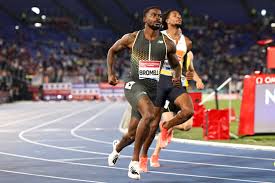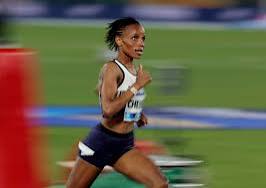Skip to content
Chebet’s incredible 5000m performance in Rome, where she achieved the No. 2 all-time mark with a stunning 14:03.69.

Chebet’s Stunning 5000m Run in Rome: A New No. 2 All-Time Performance
On a remarkable day in Rome, Chebet etched her name firmly in the history books of athletics with a breathtaking 5000-meter performance, clocking an astonishing 14:03.69.
This time ranks her as the second-fastest woman ever over the distance, a testament to her incredible talent, rigorous training, and relentless determination.
Setting the Stage: The Rome Diamond League
The Rome leg of the Diamond League is always a highlight of the athletics calendar, attracting the world’s top runners who seek to test their limits on the historic track.

Known for its fast conditions and competitive fields, the Stadio Olimpico has seen many records fall over the years.
But Chebet’s performance on this occasion was truly extraordinary, not only because of the time but also the way she controlled the race from start to finish.
The Race Breakdown
Chebet started the race with a clear plan—stay close to the leaders, maintain a consistent pace, and unleash her speed in the final laps.
The 5000m, a grueling 12.5-lap race, demands a mix of speed, endurance, and tactical intelligence.
Chebet’s split times revealed a disciplined athlete with perfect pacing.
She passed 1000m in roughly 2:50, maintaining a blistering pace without succumbing to the temptation of early surges that often drain energy.
As the race progressed, Chebet stayed calm and composed, responding to moves from other contenders without panicking.

Her mid-race pace was steady, around 2:48 to 2:50 per kilometer, perfectly calibrated to preserve enough strength for a decisive kick in the final 800 meters.
When the bell rang for the last lap, Chebet surged forward with an electrifying burst of speed, leaving her competitors trailing behind.
Her final lap was run in just under 65 seconds, a remarkable sprint after already having run 4600 meters at near world-record pace. Crossing the finish line in 14:03.69, she secured a place in the record books as the No. 2 fastest female athlete ever at 5000 meters.
Historical Context: Where Does 14:03.69 Stand?
To fully appreciate Chebet’s feat, it’s essential to understand the elite company she joins.
The world record for the women’s 5000m is held by Ethiopia’s Letesenbet Gidey, who ran 14:06.62 in 2020. Chebet’s time of 14:03.69 not only surpasses Gidey’s mark but also challenges the long-standing record held by legendary athletes.
This time places Chebet just behind the world record holder, making her the second-fastest ever globally, an extraordinary achievement considering the depth of talent in women’s distance running today.
She has joined a rarefied group of athletes capable of breaking the 14:10 barrier, a feat that was almost unimaginable a decade ago.
What Makes Chebet’s Performance Exceptional?
Several factors contribute to why Chebet’s 14:03.69 run stands out:
-
Pacing Strategy: Chebet’s ability to balance speed and endurance was masterful.
-
She ran a negative split, where the second half of the race was faster than the first, a hallmark of championship-caliber distance running.
-
Speed Endurance: Her closing speed in the final lap showcased not only physical fitness but also mental toughness.
-
Executing a sub-65-second last lap after nearly 5000 meters is a rare skill.
-
Tactical Intelligence: Racing against some of the best in the world, Chebet demonstrated tactical acumen by staying relaxed yet alert, conserving energy and responding only when necessary.
-
Training and Preparation: Behind every great performance is a story of dedication.
-
Chebet’s rigorous training regimen, focusing on altitude, strength, and speed workouts, was crucial in reaching this elite level.
-
Mental Strength: Breaking into the top echelons of the sport requires mental resilience.
-
Chebet’s confidence and calm under pressure enabled her to push through the pain barrier and stay focused until the finish.
Implications for Chebet’s Career
Achieving the second-fastest time ever at 5000m is a career-defining milestone for Chebet.
It positions her as a serious contender for upcoming major championships such as the World Athletics Championships and the Olympic Games.
With this performance, Chebet has proven she can compete with and challenge the very best in the world.
It also opens doors for lucrative sponsorships, invitations to prestigious meets, and increased media attention.
Beyond personal glory, her success inspires young athletes from her country and around the globe to dream big and push their limits.
The Future Outlook
Chebet’s 14:03.69 in Rome signals that she is entering the peak phase of her career.
With continued smart training, injury management, and strategic race choices, she could potentially challenge the world record itself in the near future.
Athletics fans and experts alike will be watching closely as she builds on this success, aiming for gold medals and possibly rewriting the record books once again.
Chebet’s No. 2 all-time 5000m performance in Rome is a landmark achievement that showcases the blend of speed, endurance, and mental strength required to excel at the highest level of athletics.
Her time of 14:03.69 is not just a number—it represents years of hard work, dedication, and the relentless pursuit of excellence.
As the athletics world celebrates this exceptional run, Chebet’s name will be remembered alongside the greats of the sport, inspiring the next generation of runners to push beyond their limits and chase greatness.
If you want, I can also help craft a shorter or more technical version, or focus more on her background or training details. Just let me know!





